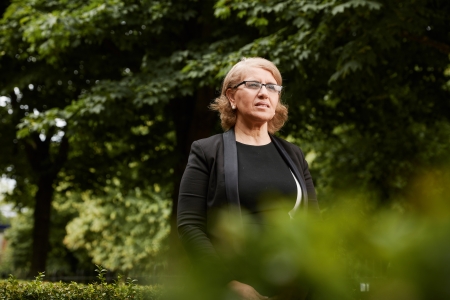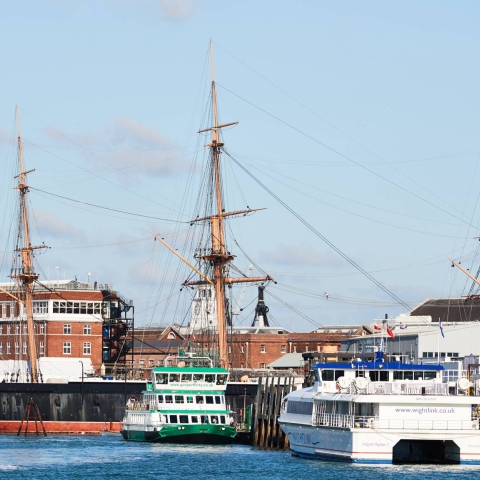
Our research aims to improve decision making, using optimisation models, intelligent computational, AI, simulation, forecasting and machine learning. Members of the Logistics, Operational Research and Analytics (LORA) group conduct and supervise research in the following fields:
- Decision and data analytics
- Optimisation modelling
- Simulation
- Multi-criteria decision-making
- Intelligent computation and machine learning
- Intelligent transportation
- Logistics and supply chain management
- Risk management, safety and security
- Algorithm design complexity analysis
Project highlight
Our most recently funded project is the Solent Future Transport Zone, which will implement and trial innovative and sustainable mobility solutions for people and for freight. This is a £28million multidisciplinary project, funded by the Department for Transport and working in collaboration with the University of Southampton and Solent Transport.
LORA will develop Mobility as a Service (MaaS) App, in collaboration with a MaaS provider, and investigate travel behaviour change to reduce private car usage, making travel journeys smarter and greener within the City of Portsmouth and the wider Solent area. The team will also investigate the environmental impacts of freight movement within the City of Portsmouth and the wider Solent areas, and develop innovative and sustainable approaches to urban logistics, reducing the impact that goods movement has on congestion, air quality, safety and journey times. The University will trial new sustainable solutions for freight distribution including micro-consolidation for last mile delivery, macro-consolidation, and drone delivery for the NHS to move medical supplies between three hospitals in Hampshire - Southampton General Hospital, Queen Alexandra Hospital in Portsmouth and St Mary’s Hospital on the Isle of Wight. Read more about our work on the Solent Future Transport Zone.

Transportation is evolving quickly and it is essential to invest and develop better solutions for the increasingly demanding challenge of providing safe, efficient, sustainable transportation for the future.
Driverless cars, drone deliveries, on-demand public transport, new data-driven mobility services requiring high-fidelity communication networks and sustainable transport systems built using novel light-weight materials and renewable energy sources are some of the ways set to revolutionise the mobility of people and goods around the world.
Research Excellence (REF 2021)
REF2021 highlighted the importance of operational research in the mathematical sciences: across the UK, "a substantial proportion of the outputs in operational research were world-leading and helped to shape the international research agenda," and "modern statistical and operational research techniques played a strong role in over half of the submitted case studies.”
REF case study – Intelligent Gatelines (ticket barriers): improving throughput, safety, customer experience, and staff effectiveness, at mainline and metro stations
Our researchers worked to create automated railway station ticket barriers (gatelines) that can optimise the passenger flow through underground and mainline stations. The result is an increased throughput of people, a reduction in delays, and automatic crowd management that reduces congestion and improves safety. We used operational research techniques to design an “Adaptive Intelligent Controller” that sits at the heart of the system, analysing the crowd flow to predict in advance the best way to open and close gates in both directions. The project was funded by the Rail Safety and Standards Board, with industrial partners including Cubic Transportation Systems Ltd, Transport for London, Arriva UK Ltd and the Connected Places Catapult.
Recent projects
We've worked on projects with international and UK business and the public sector in transportation, renewable energy, and risk, including:
- The Solent Future Transport Zone (£28.75 million consortium) provides sustainable solutions for the transport of people and goods, and Intelligent Gatelines (£1.3 million consortium) improved passenger flow and crowd management, leading to one of our impact case studies.
- LEANWIND (€15 million consortium, with 31 partners) addresses challenges posed by the life-cycle of offshore wind farms, and WASP (£900,000 consortium) uses autonomous vessels to maintain them.
- NEREUS (€7 million consortium) transforms wastewater into a reusable source of water, nutrients and energy, and SLIC (€4 million consortium) improves public lighting to increase uptake of renewables and reduce carbon emissions.
- ARCSAR (with 21 partners) helps Arctic and North Atlantic coastguards prepare for security and safety threats.
-
Drone Swarm for Unmanned Inspection of Wind Turbines (Dr-SUIT): a project to deploy drone swarms capable of autonomous inspection in offshore windfarms. In partnership with Airborne Robotics and Bluelark
-
Cooperative Brachytherapy Project (CoBra), which aims to improve the quality of diagnosis and treatment of localized cancers by developing a new medical robot prototype for brachytherapy and biopsy under guidance of MRI
-
Artificial Intelligence based Virtual Control Room for the Arctic: an Automatic Arctic Sea Vessel Anomaly Detection (AI-ARC) project, funded by the European Commission.
-
Taking Decisions About Information Value, which is a cross-disciplinary project, helping investigators to make better judgements about the value of information from interviews and intelligence. Funded by ESRC and CREST (Centre of Research and Evidence of Security Threats), in collaboration with a subcontracted software development company (Polaris Consulting).
Interdisciplinary collaboration hubs
We have jointly founded three cross-disciplinary hubs to increase external collaborations:
- We achieved our REF 2014 strategic aim to create a Centre for Operational Research and Logistics, co-founded with our Faculty of Business and Law, which brings together interdisciplinary teams of researchers with public and private sector partners, to address challenges in areas including technology, efficiency, and sustainability.
- The South Coast Centre of Excellence in Satellite Applications unites academic institutions, businesses, and local authorities, to address challenges spanning healthcare, media, education, construction, environmental resource management, tourism, and agriculture.
- The Intelligent Transport Cluster brings the expertise of academics from across the university to end-users, to help build smart, safe, sustainable, and efficient transport systems fit for the cities of the future.
Explore our research areas of expertise
Decision and data analytics
Research in the design of decision support systems, and use of data analysis, to help people make better decisions through a better understanding of their data.

Exact and metaheuristic solution methods
Heuristic and metaheuristic techniques are powerful and flexible research methodologies that offer a faster way of solving complex logistical challenges.

Healthcare analytics
From nurse scheduling to infection and disease modelling, our research provides decision-makers in the healthcare sector with optimal strategies for treatment.

Multiple criteria decision aid
Approaching complex problems with conflicting criteria, or uncertain data, our research helps people make more informed decisions.

Optimisation Modelling
As well as improving business efficiency, we're enabling people to make optimal decisions that can lead to practices with enhanced economic, environmental or social benefits.

Renewable Energy and Sustainability Analytics
Modelling to answer a host of questions, from how to produce renewable energy more cheaply, to how the associated logistics can be sustainable.

Risk and security analytics
We help organisations learn from failures, so they can improve the quality and resilience of their operations, and we develop new analytic approaches to detect security threats.

Transportation and Maritime Systems
Our research focuses on developing innovative optimisation models and decision support systems, to help improve the mobility of people, goods and services.

Interested in a PhD in Mathematics?
Browse our postgraduate research degrees – including PhDs and MPhils – at our Mathematics postgraduate research degrees page.
